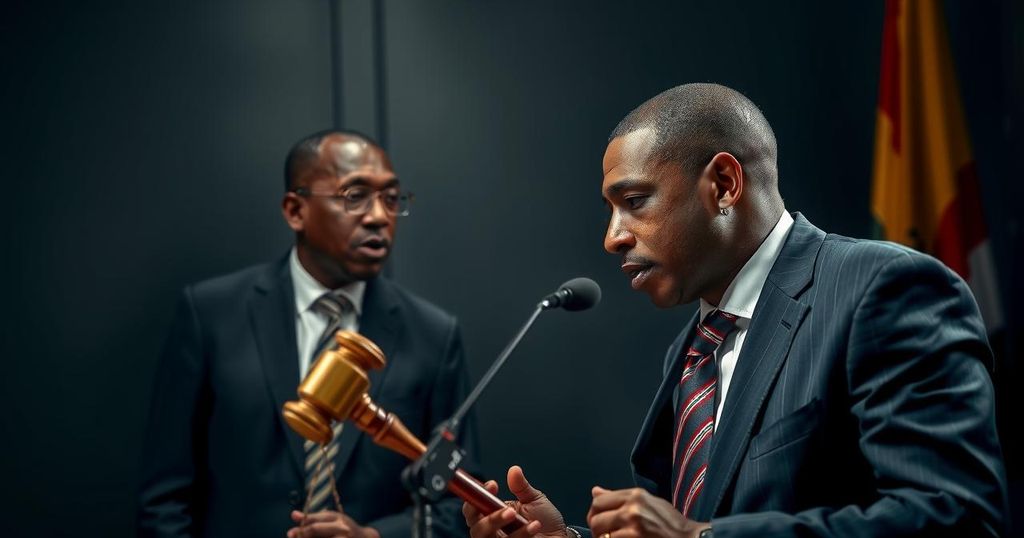Ugandan Lawyer Calali Takes Legal Action Against DRC Over Prisoner Rights Violations

Ugandan lawyer Kalali Steven has filed a lawsuit against the DRC at the East African Court of Justice, accusing the nation of severe human rights violations in Makala Central Prison. Allegations include extreme overcrowding, physical abuse, and sexual violence towards female inmates. The case follows a deadly jailbreak incident and seeks accountability for the DRC’s actions under EAC and international law, as well as improvements in prison conditions.
Kalali Steven, a lawyer from Uganda, has initiated legal proceedings against the Democratic Republic of Congo (DRC) at the East African Court of Justice, asserting that the conditions within the Makala Central Prison are marked by severe human rights abuses. The lawsuit alleges significant overcrowding, physical mistreatment, and concerning reports of sexual violence towards female detainees at the facility based in Kinshasa. Kalali contends that these conditions contravene both the East African Community (EAC) Treaty and various international human rights statutes. The case has been submitted to the First Instance Division in Arusha, Tanzania, with the objective of holding the DRC accountable as a Partner State within the EAC. This legal move follows a catastrophic jailbreak attempt in early September 2024 at Makala Prison, during which it was reported that hundreds of lives were lost due to violent interventions by security forces. Kalali has stated, “DRC forces used live ammunition on unarmed inmates,” referencing over 129 fatalities that constitute a violation of the fundamental right to life as outlined in the EAC Treaty. According to a United Nations report, the prison, which was originally designed for 1,500 inmates, held approximately 14,000 individuals at the time of this incident. Kalali emphasizes that such extreme overcrowding is a gross violation of human dignity and breaches Article 7(2) of the EAC Treaty, which mandates compliance with international standards concerning the treatment of prisoners. Moreover, the lawsuit brings attention to alarming allegations regarding sexual violence, with Kalali declaring that “269 out of 348 female prisoners reportedly experienced sexual abuse,” based on findings from the United Nations Population Fund (UNFPA). He argues that this failure to provide a safe environment for female inmates violates international conventions on women’s rights. The lawsuit also cites restrictions on access to legal and civil support following the attempted jailbreak, claiming that the rights of detainees have been compromised. Kalali notes that legal representatives and civil organizations have been barred from accessing the inmates, contravening Article 8(1)(c) of the EAC Treaty, which guarantees the right to legal representation and necessary services, stating, “Inmates lack legal representation and necessary services, violating the Treaty’s principles on justice.” Additionally, Kalali alleges that minors are being improperly detained alongside adult inmates at Makala Prison, a practice that poses significant risks to young detainees and violates both international standards and the United Nations Convention on the Rights of the Child. In his lawsuit, Kalali seeks a declaration from the court that the DRC is in violation of the EAC Treaty, demands compensation for affected inmates, and calls for reforms to enhance prison conditions. He also requests an injunction to prevent further abuses in the future. Kalali’s case is significant for the East African region, as it raises critical concerns regarding the accountability of Partner States for the protection of human rights within the EAC. He asserted, “The EAC must ensure the protection of its citizens’ rights,” emphasizing the need for the court to uphold regional standards and compel DRC compliance with its human rights obligations. As this case progresses, human rights advocates across East Africa are keenly observing its potential ramifications on prisoner rights and the enforcement of state accountability within the EAC, as the verdict could establish a pivotal precedent for prison administration and human rights adherence throughout the region.
The legal actions taken by Ugandan lawyer Kalali Steven center around imminent concerns regarding human rights violations in the DRC’s prison system, particularly at Makala Central Prison. This facility has been noted for significant overcrowding and poor conditions that have led to grave allegations of abuse and neglect. Such issues are not only a matter of national law but also of regional and international human rights obligations, prompting legal challenges from neighboring states and organizations. The East African Community Treaty lays the groundwork for upholding and protecting the rights of all citizens within the member states, and Kalali’s lawsuit positions itself within this framework, seeking broader accountability from the DRC for failures to ensure humane treatment of prisoners.
In summation, Kalali Steven’s lawsuit against the Democratic Republic of Congo at the East African Court of Justice highlights critical violations of human rights within Makala Central Prison, including severe overcrowding, reports of sexual violence, and lack of legal access for inmates. The case argues that the DRC’s actions violate both the EAC Treaty and international human rights standards. The outcome of this case could set a vital precedent for human rights enforcement and prison management practices across the East African region, compelling states to adhere more strictly to their obligations under international law.
Original Source: allafrica.com








